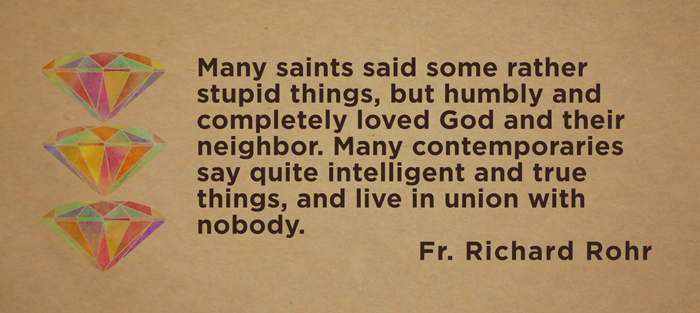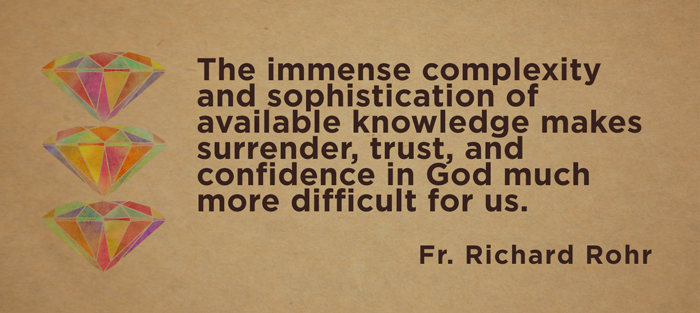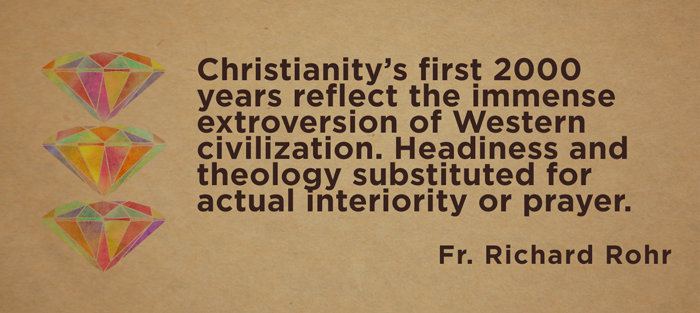Interview by Evan C. Rosa
Last week, we published part one of our exclusive interview with Fr. Richard Rohr, a Franciscan priest in Albuquerque, New Mexico, and internationally recognized spiritual leader and speaker. Last time, we got to foundational questions about what action has to do contemplation; “self-centered” psychology; the tension in us between true self and false self, finding peace in our information age; his book, Immortal Diamond, and more besides. Click here to read part one.
If there’s one thing that comes through when in conversation with Fr. Richard, it’s the sense of a serene and peaceful confidence. His ability to transmit that sense in conversation is astounding. Thanks, Fr. Richard, for your time. And may you, kind reader, find that sense of serene confidence in reading Fr. Richard’s words.
Evan Rosa: What is mysticism? How should Christians in a scientific, empirical society approach the mystical in their everyday life?
Richard Rohr: For me, mysticism simply means experiential knowledge of God, as opposed to mere church knowledge, memorized knowledge, or doctrinally true knowledge. In much Biblical and traditional language, mysticism was probably described as “wisdom” as opposed to knowledge, intellect, or understanding. We even see that both Isaiah (11:2) and Paul (1 Corinthians 12:8-9) distinguish these as two different kinds of gifts.
Wisdom or mystical knowing is not opposed to reason or logic, but simply a different level of perception, which often needs and builds upon the first kind of knowing. Up to now we just did not have the language to describe it properly, it seems. (Frankly, many Hindus, Buddhists and Sufis developed a much stronger language to describe inner states. I hope that does not make Christians mistrust me, but it must be said because it is obvious once you work in this field.) Christianity’s first two thousand years reflect the immense extroversion of Western civilization. Headiness and theology substituted for actual interiority or prayer.
Many saints said some rather stupid things, but humbly and completely loved God and their neighbor. Many contemporaries say quite intelligent and true things, and live in union with nobody.

Thanks to the many studies in developmental psychology, and ever-new understanding of levels of consciousness (Spiral Dynamics, Integral Theory, etc.) we now have a new vocabulary and ability in the West to understand the mystical mind on its own terms. Some like myself might call it “non-dualistic thinking” or “contemplation,” which I talk about in my book The Naked Now. I thought I would get major pushback on that book. Both from Christians, because it introduces a new word that Christians think of as “Eastern,” and from secularists because it challenged many of their glib prejudices about believer. And, ironically, it has met with overwhelming positive response and a kind of grateful astonishment—and almost no hate mail! (Maybe that means that thinking people have just given up on me!)
What do you say to people who are constantly tempted by busyness, boredom, and blindness—modern–scientific people. (Admittedly, I am one of them.) How can people of the rational mind—open up to mysticism?
You must develop some daily practice of non-dualistic thinking (is that the heart of prayer?) and then the mystical mind will open up for you with God’s clear guidance. Only then are you free from your own self-talk, argumentativeness, prejudices, and private agendas. This challenges progressive and educated thinkers just as much as conservative people, and sometimes even more.
You’re a Franciscan priest. You’ve spoken about the Art of Letting Go and Hope Against Darkness—both deeply Franciscan ideas. But you’ve also indicated that St. Francis lacked an anthropologically/psychologically integrated approach to spirituality. What does integration look like to you? What does our nature have to do with our transformation?
I am not sure exactly where you are quoting me from in this question, but let me put it this way here. Francis was a 13th-century Medieval, Italian Catholic. As such he could only reflect that stage of historical development, and yet he also rose amazingly above and beyond it. That is what you need to look for.
True holiness takes you far and beyond your contemporaries in how you read cultural situations. In terms of Spiral Dynamics, Francis lived in an age of red (individual power) and blue (conformity to group) thinking, and yet often talked and taught at a green (pluralistic/equality level), and in his later life even at “second tier” or a “unitive consciousness” level—while occasionally falling back at times into his own limited time in history—as all of us cannot help but do. (Even Jesus did when he called the Syrophoenician woman a dog in Mark 7:27).
Ken Wilber wisely distinguishes between stages of consciousness (where you live in history and the evolution of the Western mind that you can draw upon in your period—archaic, pre-rational, rational, etc.) and states of consciousness (your sense of separation from—or union with—God/reality); this is the slow movement from the totally dualistic thinking of the usual 10 to 12 year old and the hopeful contemplative mind of the senior citizen who has completed his or her work.
Surely Jesus and also Francis reflect a very high state of unitive consciousness with the Divine, but Francis (Moses, the Prophets, and Jesus too) still fall back on their precise time in history—our awareness of science, human rights, political correctness, and things like slavery and women’s rights being totally unavailable to them.
Holiness has to do with your state of surrendered union with God and Reality. Growth and intelligence have to do with where you emerge in history, the refinement of knowledge in your time, your precise education, and what stage of development you can then represent. Jesus, and Francis had none of the benefits of modern science (Early Stage), but they still broke through to a high level of experienced union with God (High State). They are holy but not always “smart” or “informed”—by our standards. We should read the Scriptures for signs of holiness and grace—and not for science, logic, or history—which is what the fundamentalists have never figured out. They thus put us in opposition to secular knowledge instead of doing the much harder work of demonstrating an alternative way of knowing that people of faith have always discovered.
Remember, of course, the opposite is true too. Many of our contemporaries are brilliant, truthful, and helpful in the areas of correct information, and we have all learned from them, as in modern medicine, which profits us all. We reflect and enjoy our stage in history, but that does not mean we have surrendered our well-defended ego boundaries, our false sense of separateness, and superiority to a Higher Power. We are often very smart, but not necessarily “holy.” A wise person can easily understand these things and make almost these adjustments.
Many saints said some rather stupid things, but humbly and completely loved God and their neighbor. Many contemporaries say quite intelligent and true things, and live in union with nobody.
You and I have the advantage of drawing upon so much history, and we are even capable of pre-rational, rational, and trans-rational thinking all at once, and some of us are still able to enjoy the mystical level of divine union and love besides. How blessed is that!
But our downside is that the immense complexity and sophistication of available knowledge makes surrender, trust, and confidence in God much more difficult for us. There are so many scenarios of meaning competing for our attention (increased a hundredfold by the internet), whereas Francis largely just had to deal with good and bad Catholics. He, and even Jesus, did not have to deal with secularism, rationalism, materialism, agnosticism, massive consumerism, a culture of non-stop entertainment of the false self, denominationalism and other religions, and the pervasive arguments of virulent atheism.
I am sure God is very patient with us now, he has no choice!

It’s clear that you think of the church as a “transformation experience”—but you’ve also been honest that the church has not done very well at this. What can be done by individual believers to restore the church to its potential as a transforming experience for the world, and not just a belief/belonging club?
This is going to sound so overstated, unrealistic, or rebellious—probably all three. Please do not hear it that way. That would only appeal to your lower levels of consciousness. I mean it in an entirely positive and trustful way, knowing it is in fact already happening:
I believe our present understanding of the Christian Gospel, and the church container which emerged to facilitate that Gospel, has to largely die in its present form for Christianity to regain its integrity and effectiveness, and to achieve its divine purpose in history.
The present form and format of church is only good (and it’s often very good) to get you started! It can often hold individuals accountable to some vision and some practices long enough until these also show their limits, and we eventually have to “fall into the hands of the Living God” (Hebrews 10:31).
We must move from our excessive reliance upon outer authority (which surely reflected earlier history) to a deep and calm inner authority that comes from contemplative prayer, vicarious suffering with and for others, making mistakes, sustained service, and the great school of relationships with earth, animals, other religions and cultures, friends and enemies—both those that work for us and those that disappoint us.
This kind of human journey can form adult Christians and adult Christian communities instead of the gatherings of the largely passive—and passive–aggressive—kind of membership we now have, where people are in various stages of stagnation in—or rebellion against—their childhood imprinting and conditioning in early-stage Christianity (e.g., a reward/punishment system for the next world).

Jesus seemed to have preached to adults who had weathered the storms of life, and not to children who already had their answers memorized. Most of what we are doing today is having to unlearn, but maybe that is the very nature of conversion too?
Yet, it is only adults who have experienced a bit of the deep reality of the paschal mystery of life and death, are ready to form church communities and not use them for their own small and group-ish purposes. We need such adult Christian communities that are not based in guilt, fear, fire-insurance policies, mere conformity, or group superiority: but in the free commitment of free people who have learned to love God and sincerely want to love their neighbor as they love themselves.
“On these two commandments hang the whole Law and the prophets as well” (Matthew 22:40).
